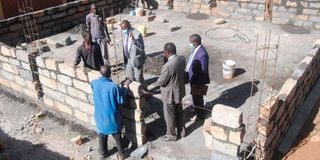Premium
Junior secondary ‘will be day schools’

Education officials inspect the progress of junior secondary classrooms being built at Molo Academy Boys Secondary School in Nakuru County in January.
What you need to know:
- The government’s focus has been on building more classrooms as opposed to dormitories.
- Normal categorisation of schools will also not apply at the junior secondary level.
Learners who will transition to junior secondary school next year under the competency-based curriculum (CBC) will attend day schools, senior government officials revealed yesterday.
Further, categorisation of schools as either national, extra-county, county or sub-county will not apply at junior secondary once the CBC is rolled out in secondary schools in January.
Speaking during a briefing hosted by government spokesman Col (Rtd) Cyrus Oguna, a senior official in the Directorate of Secondary Education Lawrence Karuntini said this was the reason why government focus has been on building more classrooms as opposed to dormitories.
“Our focus is that this should be a day rather than a boarding school. The transition from Grade Six to Seven will be in such a way that students transit to schools that are nearby,” Mr Karuntini said.
There is expected strain on secondary schools infrastructure in 2023 and 2024 when there will be a double intake in each year as learners under the CBC transition to junior secondary while the last 8-4-4 classes join Form One. The official said the government targets to have built over 20,000 classrooms by January.
In addition, schools are expected to utilise the Sh5,000 capitation per student for infrastructure to build more facilities.
The director of quality assurance and standards at the Teachers Service Commission, Mr Reuben Nthamburi, said more teachers and interns will be employed to cater for the increased enrolment. This has already been factored in the 2022/2023 budget. Training of 60,000 secondary teachers on the CBC pedagogy is ongoing and will end on May 13. The remaining 56,000 will also be trained before January, according to plans by the TSC.
Speaking at the same briefing, a deputy director in the State Department for the Implementation of Curriculum Reforms, Ruth Mugambi who is a technical advisor to the principal secretary, said learners who will join Grade Seven next year will be taught by secondary school teachers.
“Junior secondary programme is a secondary school affair and students will be taught by teachers at that level”, Ms Mugambi said. She said admission to the schools will be guided by the capability of the parents to transport their children to the school of their preference, performance in the Grade Six assessment and the choice of the learner.
Two weeks ago, the PS in the Department for the Implementation of Curriculum Reforms, Prof Fatuma Chege, cleared the air over the domiciling of the junior secondary.
“There is a lot of confusion over where junior secondary will be ... the fact is that it will be part of secondary school and principals must prepare to handle them,” she said during the closing ceremony of the Kenya Secondary Schools Heads Association conference in Mombasa.
The PS also asked principals in boarding schools not to be scared of the CBC students as majority of the learners will be enrolled in nearby day secondary schools.
“The CBC task force recommended that junior secondary should be in day schools and a lot of development has been made to ensure that they accommodate these students,” she said.




